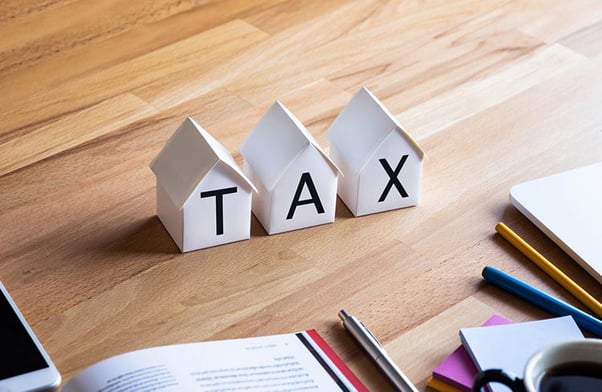
While real estate tax and property tax may sound like the same things, there are some distinctions. At a high level, real estate taxes are a group of various types of taxes imposed on real estate. Property tax happens to be one of those types. Let’s look at the various taxes that compose real estate taxes.
Property Tax
A property tax is a tax paid on the property you own. An assessor will determine the value of land and any building on that land. Some land may not have a building, and in those cases, only a land tax is assessed. However, that is still a property tax.
The assessor doesn’t set tax rates. Property tax rates are determined by local government bodies. Taxes collected by the local government help fund public services.
When neighboring properties are improved, it can cause the value of surrounding properties to increase. This can also increase property taxes. Even for properties with no structures (land only), their values and thus taxes may increase.
Property taxes are usually part of an escrow or mortgage payment. Rather than paying property taxes directly, they are taken out of the homeowner’s mortgage payment. Homeowners still receive an annual property assessment and tax notice so they can see the value of their property and how much in taxes they’ll pay.
Property Gains Tax
A property gains tax is a tax incurred when a property is sold for a profit. There are a few conditions that determine the amount of taxes a homeowner will pay.
If the homeowner lived in the home for less than a year, he’d be taxed at his ordinary income tax rate on any profit from selling the home.
If the homeowner lived in the home for more than a year but less than five years, he’d pay long-term capital gains rates.
If the homeowner lived in the home for at least two of the last five years, he wouldn't owe any taxes on the first $250,000 in gains if filing single. For married couples, the first $500,000 in gains is tax-free. The home must be the primary residence to take advantage of this tax treatment.
For gains above $250,000 or $500,000, there's still a way to defer taxes on those gains depending on tax filing status. However, this technique is for investors rather than primary residences. The technique is called a 1031 exchange. By exchanging one property for like-kind property, an investor can defer taxes on gains.
As you can see, real estate tax is just a broad term for the various types of taxes that can be incurred on real property. When discussing real estate taxes, it is probably better to specify which tax you're referring to.
This material is for general information and educational purposes only. Information is based on data gathered from what we believe are reliable sources. It is not guaranteed as to accuracy, does not purport to be complete and is not intended to be used as a primary basis for investment decisions. Realized does not provide tax or legal advice. This material is not a substitute for seeking the advice of a qualified professional for your individual situation.



